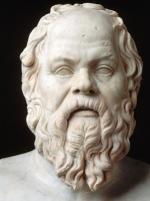|
This section contains 9,167 words (approx. 31 pages at 300 words per page) |

|
SOURCE: "Is There a Socratic Moral Philosophy?," in The Foundations of Socratic Ethics, Hackett Publishing Company, Inc., 1994, pp. 3-44.
Here, Gomez-Lobo contends that Socrates's own admission of ignorance does not undermine what has long been recognized as the philosopher's significant contribution to the field of ethics. Gomez-Lobo concludes that by disavowing moral knowledge, Socrates does not refer to a complete lack of knowledge, but rather asserts his willingness to constantly reexamine his beliefs.
Socrates, as he appears in the Platonic dialogues, is a living paradox. He has become impoverished, but he nevertheless interacts with rich aristocrats such as Critias and the relatives of Plato. He implicitly criticizes Athenian democracy and yet fulfills his basic civic and military duties faithfully. He opposes an illegal measure under the democratic regime; he also disobeys orders issued by the tyrannic government of the Thirty. He is physically ugly but his beauty of...
|
This section contains 9,167 words (approx. 31 pages at 300 words per page) |

|


